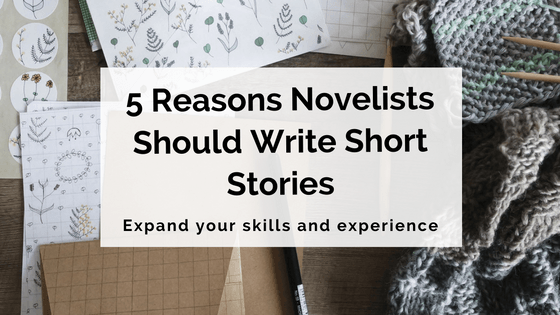The ability to write a short story, and write it well, is invaluable to any author. Novelists in particular can benefit from regularly immersing themselves in short fiction.
Writing short stories…
- Develops creative and critical skills.
- Builds portfolios.
- Provides the opportunity to expand experiences with submissions, editors and professional expectations.
- Furthers your understanding of genres and potential readerships.
- Helps construct a strong authorial presence and gets your name ‘out there’ as a published author.

Learn how to write a short story here.
If you’re wading your way through the umpteenth draft of your novel, or even if you haven’t quite started yet, read on for five reasons you should stop what you’re doing (just for a bit) and start writing short stories.
1. Short stories develop your skills
As a novelist, you’re used to long-form fiction where you have the time, the space and the word count to really roll into your setting, flesh out your characters, expand on subplots, and explore relationships to their full extent.
In a short story, you have none of this. In a short story, every word matters.
But wait – a short story and a novel are totally different beasts, aren’t they?
Sure, to an extent. And just because an author nails short fiction doesn’t mean they’ll be able to handle the longer forms. But if you can, you’ll be a creative force to be reckoned with.
To get to the guts of the action without all those words in the way; to reveal a character’s inner conflicts in just a sentence or two; to move the narrative forward without losing reader engagement – this is what every good story, not just short, should do.
The tools you pick up when crafting short stories can and should be transferred into your novel. Let’s take a look at some of the transferable skills you can develop through regular short story writing.

Controlling pace and modulation
Thanks to an emphasis on keeping only what’s absolutely necessary, short stories naturally have strong pace and effective modulation.
A writer of short stories must be able to recognise scenes and elements such as dialogue and description that move the narrative along, as well as those that slow it down, removing aspects that serve no purpose.
(Here’s how to write dialogue in a story.)
This approach is applicable to a novel from a structural and line-by-line level. Just because you have room for more words in a novel, it doesn’t mean you should waste them on details that hamper the pace and disrupt the modulation of the narrative.
Think about each scene, each chapter, each moment, the same way you would if you only had 3000 words to play with.
Starting in the action
An unfortunate habit of novelists – first-timers as well as well-practised – is to start too early, or to ‘write yourself into the story’. This is fine for the first draft, as long as you remove the extra padding later on. If you don’t, though, this can mean the death of your novel before it’s even begun.
A reader (or potential publisher) will lose interest quickly if page after page goes by, nothing happens, and the point of the narrative isn’t revealed. For example, a story about kidnapping should feature the kidnapping in the first few pages, if not the first page itself.
Unlike a novel, a short story doesn’t have the luxury of wasting words. A short story will always start right in the middle of the action.
(To clarify, action does not necessarily need to be physical. The term ‘action’ refers to emotional, physical, mental and/or spiritual events that form the crux of your narrative.)
Your novel should strive to do the same as a short story and start in the action. Setting, backstory, relationships and character traits: this information can be filtered in bit by bit throughout your first few chapters.
Readers love the immediacy of starting in the action and you’ll find the best novels all begin this way, ‘hooking’ the reader from the first line of the first chapter.
Regular short story writing hones your ability to recognise the best point to start your opening scene and ensure you always have that ‘hook’.

Creating round characters
Working within a restricted word count forces your character descriptions to evolve. Effective short story writers can construct characters with complexity, credibility and emotion using as little as a sentence or two.
In order to achieve this, short story authors ditch the info-dump that novelists can be notorious for and instead employ clever dialogue, interactions and reactions, flashbacks, and short sharp imagery to develop their characters.
They show character development while actively moving forward through the narrative, rather than telling the reader how it is and stalling the flow.
Short story writers also consider their characters’ necessity before committing to them. A full cast can be as little as one or two well-constructed characters, rather than a cluster of ten paper-thin personalities. A character must always bring something crucial to the narrative to be included.
Short stories often possess extraordinary characters that stay with a reader long after they’ve finished reading.
Ensure your novel does too by transferring these short story skills to the way you approach your novel’s characters. Immediately your protagonist becomes more credible, your antagonist three-dimensional.
You should cut out every character that doesn’t bring at least two vital elements to your story.
Learning to trim the fat
This is by far the ultimate skill to be gained from regular short story writing: the ability to cut the fat. To self-edit effectively, efficiently and without emotion.
In other words, to sharpen your manuscript.
Thanks again to that restricted word count, short stories have no time for easing into things, for unnecessary descriptions, rambling conversations, slabs of backstory or pointless tangents. A short story is just that: short. And they almost always pack a punch.
Trimming the fat is as crucial in novels as it is in short stories – perhaps even more so. A novel needs to hold a reader’s attention a lot longer than a short story, and not cutting the fat is a quick trip to boredom.
So you’ve become attached to that Oscar Wilde-esque description of a summer’s day in Chapter Seven. Or you’re particularly proud of your protagonist’s dissection of femininity in a paladin-ruled world. That’s all well and good.
Do you really need it, though?
Trimming the fat doesn’t mean losing the heart and soul of your story. Quite the opposite: cutting out unnecessary details clarifies your narrative, emphasises themes, and brings relationship intricacies to the forefront.
Without cutting the fat, the weight of your characters’ silences or the subtle undercurrents of mood may have been lost, buried beneath overwriting and generally unnecessary information.
To make sure your novel packs as much punch as a sharp short story, hone your skills through regularly engaging in the merciless editing short fiction requires. Your narrative will be better for it!

2. Short stories build portfolios
A writing portfolio is a collection of polished, published work that a writer uses as something of a resume when submitting new work, or applying for a permanent or freelance writing position.
It is the proof that you can do what you’re promising: write, edit, proofread. It shows you can deliver a finished product that someone, somewhere out there, believed worthy enough for publication.
A portfolio is the summation of a writer’s career to date and the more you have in there, the better your chances of standing out from the crowd and being taken seriously as a skilled creative individual.
Suffice to say, a strong portfolio is vitally important to furthering your writing career. So how do short stories help you with this? Well, it all comes down to turnaround time.
A short story, though challenging, takes a fraction of the time a novel does. Word count again is a huge contributor to this fact.
Short stories can be as short as you like, even under 1000 words (flash fiction), which means you can potentially write, edit and finalise a whole piece in a single afternoon if the mood strikes you (and the internet with its plethora of distractions goes down for six hours).
With the ever-expanding realm of online and digital publishing available around the world, there are any number of possibilities available to you. Getting a short story published is a more accessible possibility than ever before.
As with anything as subjective as creativity, there is almost always going to be someone who loves your work; you just have to find them.
Write short stories and try to get published regularly: your portfolio will shine.

3. Short stories help you expand your experiences
A writer can never have enough experience working within the industry. Consistent short story writing and the subsequent process of gaining publication will expose you to vital aspects such as submissions, rejections, editors and professional expectations.
Submissions
Every publication has its own submission guidelines and as a submitting author, you are expected to find and follow these guidelines. And by guidelines, we mean rules.
In a digital world where everyone seems to be writing, editors are getting pummelled. In order to streamline their ability to read, accept and reject, they create these rules. Usually they are simple: font size, line spacing, numbered pages, file type. Others are more complicated.
As a writer asking to be considered, you’re obligated to comply with these rules. Don’t think your work is so fabulous that it’s above these rules. It’s not. And even your work was that good, it might not even be read if you don’t follow the guidelines. Some publications won’t even open a document if it’s not the right type of file (i.e. PDF instead of .docx).
The more experience you can gain locating and working within these submission guidelines, the better, because when you submit your novel for publication, this stuff really counts. Publishing houses have even less time for unknowns and less patience for breaking their rules.
You don’t want to miss out on a publication opportunity because you didn’t bother changing your font.

Rejections
As with all ups there are downs, and unfortunately not all submissions end in acceptance. Rejection is a brutal part of a writer’s life and the sooner you come to terms with this, the happier you’ll be.
Creative writing is subjective. Some people will love your work and others will hate it. Some editors will want to publish you right away; others will say ‘sorry, no thanks’ and ‘not suited for our publication’.
It’s okay. Even if your writing is rejected, you can learn how to cope.
As a writer you need to be a little tougher than the average Joe. Yes, you poured everything into these 2000 words and yes, it reads as well as any of Hemingway’s, but you need to brace yourself: it’s probably going to get rejected the first time. And maybe the second and third time. Heck, it might get knocked back ten times before some one says yes.
Take it on the chin and move on to your next option.
That might seem impossible the first few times. But that’s why this experience is so important. The more you’re exposed, the stronger you’ll become.
Rejection hurts, but it doesn’t define you or your work. A successful writer is a persistent one. And you need to be, because short stories get published a lot more than novels.
Editors and professional expectations
Some publications will provide editorial feedback and professional engagement if your short story is selected for publication (sometimes even if it’s not, though this is rare).
This is an invaluable resource.
Editors provide constructive feedback that can be instrumental in refining not only your current short story, but your approach to future creative projects. Editors can highlight structural issues or sentence-level problems. Alternatively, they can point out something as simple as a repeated misuse of an apostrophe.
Sometimes an editor’s feedback is negotiable, and sometimes not. Sometimes changes will be made to your work prior to publication without checking with you (in the case of punctuation and grammar), but this would be outlined as a common procedure in the submission guidelines.
Access to an editor is priceless. Continued exposure to the editorial process will further your ability to understand technical conversations, recognise repeat issues, self-edit your own work, and discuss the strengths and weaknesses of your writing with an open and critical mind.
Your confidence in dealing with industry professionals will increase, as will your understanding of publishing industry etiquette – all crucial when approaching a potential publisher with your novel.

4. Short stories help you understand genres, readers and the marketplace
By regularly writing and submitting short stories to publications, your knowledge of genres and sub-genres will grow, as will your ability to pinpoint the most appropriate readership for your work.
As an extension, you’ll reach a higher understanding of the creative marketplace as a whole and where your work sits within it.
Before submitting to any publication, a certain amount of research is undertaken by the writer. This is to ensure the work is submitted to a publication that is well-suited, which in turn will increase the likelihood it will get published.
Submitting 3000 words of romance to a horror e-zine is a guaranteed gut-wrenching rejection (unless your romance features shrieks of terror rather than love).
As a writer, it’s vital that you learn how to navigate genres and sub-genres.
A lot of publications specialise in, or exclude, specific genres and styles.
Through the ongoing research and analysis that preludes each short story submission, your skill in identifying and categorising your own work, and the work of others, will increase.
After a while, you may begin a short story with a target reader in mind, and with a clear idea of the genre you’re working within. Clarity when approaching narrative is only ever a good thing and will assist you later when considering which publishing house to pitch your novel to.

5. Short stories help get your name out there
An authorial persona is your professional brand. It is the idea that comes to people when they hear your name. An authorial persona is crafted by publications, your public personality and your online author presence.
Your authorial persona begins construction from the moment you start publishing work and only gets bigger the more you ‘get your name out there’.
Short stories are a fantastic way to begin construction of your public author presence. Not only is the turnaround time quick (relative to a novel), but the flexibility of being able to jump between topics, genres, styles and readers is fantastic for stifling boredom and avoiding being pigeon-holed as a ‘type’ (i.e. a great horror writer and nothing else).
On the other hand, if being defined as a certain type of writer is exactly what you want, then you have the ability to build a persona entirely within one pocket of the market.
For example, if you’re writing a romantic novel and want to establish yourself in that market post-haste, you can churn out a few romantic short stories.
Any positive authorial persona you create can aid you when seeking publication for your novel. Any author with an established public presence is a boon to publishing houses. Instead of having to start with nothing, you have provided them with an established professional platform and an already growing audience.

***
The novel and the short story: two opposing creative creatures that share more in common than most realise. Unfortunately, the short story is often disregarded by novelists as pointless, but instead it should be embraced, and regularly.
Narrative tools, skills, awareness, experiences and authorial identity are all transferable from short- to long-form fiction and can really maximise the potential of any novel.
Short story writing provides novelists with a multitude of opportunities for creative and professional development, so why not try one today?
7 responses to “5 Reasons Novelists Should Write Short Stories”
Insightful article with plenty of reasons to embrace writing short stories. Thanks Maggie for sharing your insights.
Great articles …. followed-up with several at bottom of page. And, since I am definitely in this category, appreciate the FBer who posted this site in our James Patterson MasterClass group.
Great information. I’ve always felt people who could write a short story possessed a special skill I haven’t been blessed with, but now I’m thinking I need to give it a try and see if it will improve my novel writing. Thanks.
If Stephen King can do it, so can I. Besides, I don’t write horror. It’s too ghastly. As for learning the ropes, even an old dog can learn a new trick or two. I’ll give short stories a try and see where they lead. Thank you for the insight into this oft forsaken venue.
We totally agree, Bryan! Any writer can (and should) give short stories a try 🙂 Glad Maggie’s post has inspired you – best of luck with your short story writing!
-Claire
I’m actually going the opposite way but I agree with this excellent article. I’ve been writing short stories for quite some time using them to build up my skills before tackling a novel. I love writing shorts but it’s time I moved up but I don’t plan on abandoning short stories or even flash fiction forever. For now I have some longer stories that need to come out of me but I don’t see myself ever not writing short stories, they’re fun. Also one thing I don’t think the article mentioned, at it’s essence a single chapter of a novel is a short story so that’s another thing to keep in mind while writing.
Hi Feind,
Definitely a great point about novel chapters being similar to short stories!
Sounds like you’ve worked your way up naturally to some longer stories, but great to hear that you’ll continue working with shorter pieces as well. It’s a good way to mix it up and keep things fresh every now and then! Best of luck with all your writing (of any length) 🙂
-Claire